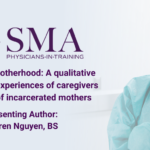Abstract | May 7, 2021
Redefining motherhood: A qualitative study on the experiences of caregivers to children of incarcerated mothers
Learning Objectives
- Identify at least 5 significant sources of stress that are common among caregivers to children of incarcerated mothers as a result of their role as the “practicing mother”, as opposed to the incarcerated mother’s role as the “biological mother”;
- Explain how the most difficult tasks that caregivers face can be framed within their larger task of redefining motherhood for the incarcerated mother, the child, and themselves;
- Identify 3 mechanisms by which caregivers' responsibilities impact their physical and mental health.
Background:
Women are the fastest growing prison population in America. In 2016, 80% of incarcerated women were single mothers, requiring others to care for their children. This responsibility often falls on the shoulders of women of color, whose experiences as caregivers impacted by maternal incarceration are often overlooked. This study details the experience of caregivers to children whose mothers are incarcerated to offer a framework to how this responsibility impacts caregivers’ physical and mental health.
Methods:
Qualitative interviews were conducted with custodial and informal caregivers to understand their perceived responsibilities; its impact on their physical and mental health; and their coping strategies.
Results:
Sources of caregivers’ stress included: losing time to maintain their own health and personal recreation; experiencing relationship strain; allocating limited resources and navigating welfare systems; and helping both child and mother work through extremely difficult emotions. Yet, caregivers persevere by utilizing moral language, help from others, and positive reflection.
Conclusions/Implications:
The caregiver’s ultimate task is clarifying the distinction between their role as the “practicing mother” and the incarcerated mother’s role as the “biological mother” to the child, the mother, and themselves. They do this in order to (1) convey to the incarcerated mother that she is not trying to take their place, (2) help the child deal with difficult emotions regarding having two mothers, and (3) determine what sacrifices she must make in order to fulfill their role. Understanding the stressors that come with this task is necessary to bringing forth the appropriate resources to support this population. Furthermore, this study demonstrates an under-studied impact of maternal incarceration while showcasing the respectable, difficult work these caregivers perform.

